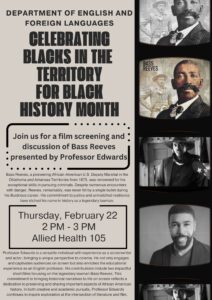
School of Arts and Sciences
DEPARTMENT OF NATURAL SCIENCES
Biology Department
A degree in Biology Department opens a world of opportunities in various fields, including medicine, research, and criminal justice. If you’re a student who wants a deeper scientific understanding that can make an impact on the world, Langston University’s Biology program will equip you with the skills you need to do so. Students address issues of personal well-being and worldwide concern. These issues include environmental depletion, threats to human health and maintaining viable and abundant food supplies. Our curriculum emphasizes coursework that includes a balance of traditional and modern biological sciences and collaborative student-faculty research.
Mission
The mission of the Biology program is to provide an excellent undergraduate education. Our curriculum embraces the breadth of the discipline and values both classical and modern approaches of biological inquiry.
Goal
Our goal is to increase students’ understanding about the natural world in which we live and help them address issues of personal well being and worldwide concern. This issues include environmental depletion, threats to human health and maintaining viable and abundant food supplies. Our curriculum emphasizes coursework that includes a balance of traditional and modern biological sciences and collaborative student-faculty research.
Objectives
- To prepare successful, scientifically literate, participating citizens who have an understanding and appreciation for both nature and scientific investigation
- To prepare research trainees for graduate studies in the biological sciences and related areas
- To prepare students who are capable of competing successfully for admission to and who will succeed in professional schools of medicine, dentistry, veterinary medicine, pharmacy, allied health, and other biomedical programs
- To prepare highly qualified biology teachers for positions in public and private secondary schools
- To prepare students for entry-level positions in conservation, natural resource management, industrial biology, agriculture, technology, and other fields
CONTACT
Degree Options & Study Plans
Langston Campus, Bachelor of Arts and Sciences
A degree in Secondary Education prepares students with the knowledge and skills to become middle and high school teachers and shape the minds of future generations. Langston’s goal is to increase students’ understanding of the natural world in which we live and help them address issues of personal well-being and worldwide concern. These issues include environmental depletion, threats to human health and maintaining viable and abundant food supplies. Our curriculum emphasizes coursework that includes a balance of traditional and modern biological sciences and collaborative student-faculty research.
Our Chemistry Department is equipped with staff and resources that prepares students to lead successful careers as Chemists, Pharmacologists or Toxicologists. If your dream is to help others by providing answers to tough questions, a degree in Chemistry from Langston University can help make your dreams come true.
Degree Options & Study Plans
Langston Campus, Bachelor of Arts and Sciences
A degree in Secondary Education equip students with the knowledge and skills they need to teach at the middle and high school levels and shape the minds of future generations. The Chemistry Education program meets and exceeds the minimum requirements of the National Science Teachers Association (NSTA) for the general expectations and of the scope of preparation for teaching secondary education. It includes thematic and major concepts and applications of inorganic, organic, analytical, physical chemistry, and biochemistry. Additionally, our curriculum includes the NSTA recommended calculus for Chemistry Education programs, as well as basic statistics courses. Our curriculum also seeks to integrate science instruction across fields, including linkages among related concepts in chemistry, physics, biology and the earth/space sciences.





